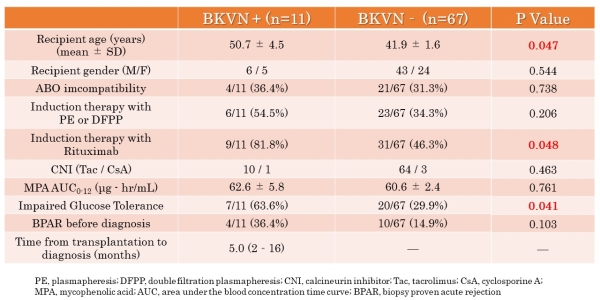Induction Therapy with Low-Dose Rituximab Could Be a Risk Factor of BKV Associated Nephropathy in Kidney Transplant Recipients
1Nephrology, Hirosaki University, Hirosaki, Japan
2Urology, Hirosaki University, Hirosaki, Japan.
Meeting: 2018 American Transplant Congress
Abstract number: C184
Keywords: Kidney transplantation, Polyma virus, Risk factors
Session Information
Session Name: Poster Session C: Kidney: Polyoma
Session Type: Poster Session
Date: Monday, June 4, 2018
Session Time: 6:00pm-7:00pm
 Presentation Time: 6:00pm-7:00pm
Presentation Time: 6:00pm-7:00pm
Location: Hall 4EF
Background.
In kidney transplant recipients, BK polyoma virus (BKV) infection is common and serious complication that could lead to graft loss. Previous studies reported that 30-40% of kidney transplant recipients develop BK viruria, 10-20% develop BK viremia and 2-5% develop BKV associated nephropathy (BKVN). Rituximab is reported as a risk factor for BKV infection and BKVN. In our center, we use low-dose, 100mg/body of rituximab, instead of normal dose, 375mg/m2, and assessed the risk of BKVN in kidney transplant recipients at our center.
Patients and Methods.
This retrospective single-center study includes 78 patients who received living donor kidney transplantation from June 2006 to November 2016. We used low-dose rituximab (100mg/body) as an induction therapy to ABO incompatible and/or flow cytometric crossmatch positive recipients. The screening of BKV infection was performed by quantitative polymerase chain reaction test in urine and/or blood. In patients with BKV infection, BKVN was diagnosed by histological analysis including positive staining of SV-40.
Results.
Eleven patients (14.1%) developed BKVN in the early period after kidney transplantation (median, 5 months). The risk factors of BKVN were higher recipient age at transplantation (P<0.05), impaired glucose tolerance (P<0.05) and induction therapy with rituximab (P<0.05).  Among the 40 patients (51.3%) who received low-dose rituximab, 13 (16.7%) developed BKV infection and 9 patients (11.5%) developed BKVN.
Among the 40 patients (51.3%) who received low-dose rituximab, 13 (16.7%) developed BKV infection and 9 patients (11.5%) developed BKVN.
Conclusions.
Induction therapy using rituximab, which ABO incompatible living donor kidney transplant recipients often received in Japan, could be a risk factor for BKVN even when used in low dose.
CITATION INFORMATION: Murakami R., Nagawa D., Nakata M., Narita I., Fujita T., Shimada M., Nakamura N., Tomita H., Hatakeyama S., Yoneyama T., Hashimoto Y., Koie T., Ohyama C. Induction Therapy with Low-Dose Rituximab Could Be a Risk Factor of BKV Associated Nephropathy in Kidney Transplant Recipients Am J Transplant. 2017;17 (suppl 3).
To cite this abstract in AMA style:
Murakami R, Nagawa D, Nakata M, Narita I, Fujita T, Shimada M, Nakamura N, Tomita H, Hatakeyama S, Yoneyama T, Hashimoto Y, Koie T, Ohyama C. Induction Therapy with Low-Dose Rituximab Could Be a Risk Factor of BKV Associated Nephropathy in Kidney Transplant Recipients [abstract]. https://atcmeetingabstracts.com/abstract/induction-therapy-with-low-dose-rituximab-could-be-a-risk-factor-of-bkv-associated-nephropathy-in-kidney-transplant-recipients/. Accessed February 14, 2026.« Back to 2018 American Transplant Congress
